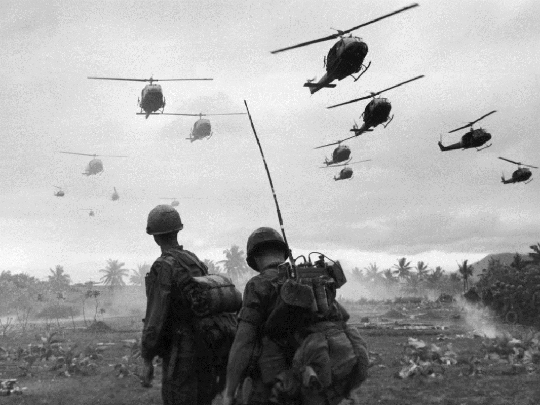U.S.-China Cold War Will Have More Than Two Sides
Pankaj Mishra | 05 April 2021
Countries aren’t going to fall neatly into opposing blocs this time any more than they did the last.
The cold war is back — or at least its rhetoric. U.S. President Joe Biden wants to forge an “alliance of democracies” against the world’s “autocracies.” The New York Times isn’t alone in thinking that “the world is increasingly dividing into distinct if not purely ideological camps, with both China and the United States hoping to lure supporters.”
This would be a profoundly disturbing development if true. The real danger ahead, however, is not so much a new cold war as binary modes of thinking that see stark divisions and antagonisms where none exist.
Politicians and journalists might find it useful to define the world through oppositions; doing so might even appear to help a polarized society such as the U.S. unite against a perceived enemy. But, as in the U.S.-Soviet rivalry, such either-or thinking can cause a fatal disconnection with reality.
The old cold war, it might be remembered, accelerated with the help of a widespread hysteria in the late 1940s over “losing” China to communism. Of course, China was never America’s to lose. Nevertheless, fear of a “domino effect” hardened the U.S. resolve, eventually costing hundreds of thousands of lives, that Vietnam should not be similarly lost.
Many books have been written about how Washington’s best and brightest were deceived by this powerfully self-perpetuating fixation. Around what President Dwight Eisenhower called the “military-industrial complex” grew a supporting intellectual-industrial complex that specialized in dividing the world into irreconcilable “blocs.”
Those positing stark oppositions between the free and the unfree world consistently failed to see that China and Vietnam were part of a larger and irreversible Asian and African drive toward decolonization, self-determination and nation-building. In this process, rendered extremely fraught by the volatility of domestic and international politics, no developing nation could afford permanent friends or enemies.
This was confirmed repeatedly by events. A military confrontation with his Soviet friends and betrayal by his chosen successor made Mao Zedong play host to President Richard Nixon in Beijing. A few years later, China was invading its former communist ally Vietnam with American approbation. More recently, Vietnam has moved toward becoming a U.S. partner.
Many of the calamitous hot wars of the cold war could have been avoided had the then-leading superpower recognized the pragmatic self-interest of smaller nations — the imperatives of self-strengthening that made Ho Chi Minh reach out to U.S. diplomats early in his career as a nation-builder. Instead, cold warriors such as U.S. Secretary of State John Foster Dulles and CIA director Allen Dulles made the world a more dangerous place with their stubborn bloc-thinking.
In one notorious and fateful act, the U.S. canceled promised aid to Egypt’s Aswan Dam at the last minute, humiliating Egyptian leader Gamal Abdel Nasser (a persecutor of communists, incidentally) and forcing him to turn to the Soviet Union for help.
The Dulles brothers also convinced themselves that India, self-avowedly neutral, was in the Soviet camp. “Dull, Duller, Dulles,” as Indian Prime Minister Jawaharlal Nehru dubbed the brothers, could not see that India, like all developing nations, was focused on pursuing its own vital interests.
This often meant playing off one superpower against another. India managed to secure Soviet military assistance and U.S. development aid at the same time as it tirelessly advocated, as a leader of the Non-Aligned Movement, decolonization in Asia and Africa.
Pakistan achieved the more remarkable feat of joining U.S.-led security treaties against communism while developing fraternal relations with communist China.
There is no question that today, forced to choose between allying oneself to a democracy or an autocracy, most countries would again choose both. They can hardly act otherwise.
Countries such as Indonesia and Vietnam surely welcome the U.S. presence in Asia as a counterweight to China. But their economies are too dependent on the latter to make an effective break with Beijing.
In fact, a fresh bonanza awaits many commodity-rich countries if the U.S. embarks on a massive infrastructure-building program. Peru and Australia will no doubt seek to sell copper to both China and the U.S.
What could violently disrupt this interplay of material interests is bloc-thinking and strategizing. Indeed, the urgent question today is not whether there will be a new cold war. It is whether modes of thought developed during the previous one, and disastrously unfit for the purpose even back then, will again dominate political and intellectual life.
Certainly, the world has changed beyond recognition since the time when think-tanks parroted theories about the “domino effect.” Communist-ruled China today purports to be an exponent of free trade, while an increasingly tariff-friendly U.S. seeks to match China’s industrial policies.
The crude division between democracy and autocracy won’t help us grasp such a topsy-turvy world. Though comfortingly simple, such cold war ideologies can never truly replace our messy reality.
Pankaj Mishra is a Bloomberg Opinion columnist. His books include “Age of Anger: A History of the Present,” “From the Ruins of Empire: The Intellectuals Who Remade Asia,” and “Temptations of the West: How to Be Modern in India, Pakistan, Tibet and Beyond.”
This article was originally published on Bloomberg.
Views in this article are author’s own and do not necessarily reflect CGS policy.
